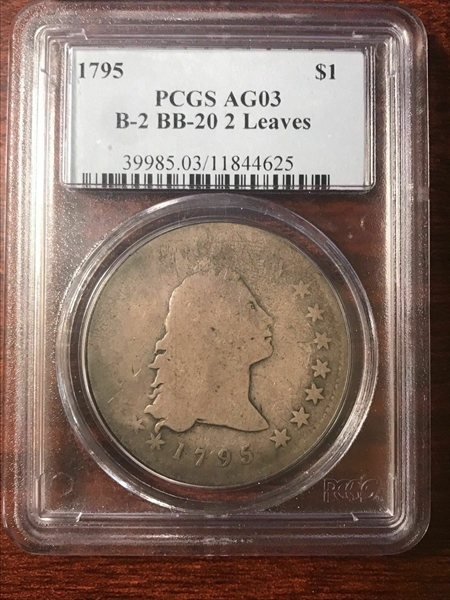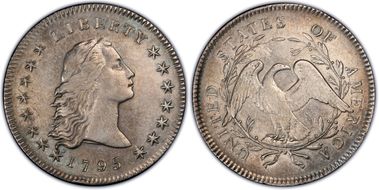1795 $1 Flowing Hair, BB-20 AG3 认证号11844625, PCGS号39985
专家评论
Q. David Bowers
Obv: Portrait II (Head of '95)Rev: Eagle I, Wreath I (2 leaves)
(B-2. H-2.)
OBVERSE 5: See description under 1795 BB-19. Close date.
Obverse die used to strike 1795 BB-19 and BB-20.
REVERSE: G: Two leaves under each wing. A leaf ends directly below center of first S in STATES and another leaf ends just under left corner of upright of E in STATES. The wreath is delicate, leaves small, berries large. 19 berries arranged nine left, 10 right. Paired berries opposite I in UNITED, opposite A in STATES, under leaf below 0 in OF, •and opposite I in AMERICA, on both inside and outside of wreath. One of these large berries is below right corner of! in UNITED, another below left corner of I in AMERICA. This is one of just two 1795 reverses with two berries inside the branch hear the eagle's tail (the other die is that used to coin 1795. B-15 and BB-16). This reverse die bears a very close relationship with the reverse used to coin 1795 BB-15 and 20, and another die used to coin BB-23, and must have been prepared by the same person about the same time.
Reverse die used to strike 1795 BB-20, BB-21, and BB-24.
DIE STATES:
Die State I: Perfect dies. Not lapped. May not exist.
Die State II: Obverse lapped, making stars (especially on the left side of the coin) somewhat thin and spidery, and separating end of lower curl from its matrix; in all specimens seen, the curl end is discontinuous to the night of the innermost point of star 1. On some specimens, the "bar" is hardly visible.
AUCTION POPULATION SURVEY: Good: 1, Very Good: 10, Fine: 19, Very Fine: 13, Extremely
Fine: 6, About Uncirculated: 4, MS-60 or better: 5. Total: 58.
COLLECTING NOTES: 1795 BB-20 exists to the extent of an estimated 300 to 500 specimens. Thus, the specialist will find acquiring one to be a snap. For reasons unknown today, most are in the range of Fine, rather than VF. For every situation there is art explanation, and perhaps someday it will be learned. Probably, the manner of distribution had something to do with it; examples of 1795 BB-20 were used widely in the channels of commerce, rather than stored by banks or bullion brokers.
The variety is typically encountered in lower grades but is rare above EF. Typically, the rims are quite raised on BB-20; coins are usually well Centered, with prominent denticulation on both sides, While higher grade pieces will often show excellent hair detail on the obverse, usually the eagle's breast is somewhat flat.
As it is believed that two specimens in the Lord St. Oswald Collection, sold in 1964, were acquired during a visit to America in autumn 1795, this indicates that this particular variety must have been struck at or before that time. This means that BB-20 would have had a greater opportunity to circulate (i.e., acquire wear) than a 1795-dated dollar struck in a later year such as 1798.
NOTABLE SPECIMENS:
Earle Specimen. MS-65 . George H. Earle Collection sale (Henry Chapman, June 1912). George Clapp. Sold to the following in 1942 . Louis Eliasberg Collection. (Coin not seen; condition estimated.)
Heifetz Specimen. MS-65 . Heifetz Collection (Superior, 1989): Lot 3815. "MS-65. Superb. A few faint adjustment marks below eagle's right wing and breast and on Liberty's neck."
Superior Specimen. MS-64 . The August Sale (Superior, 1991): Lot 553, MS-64, exceptionally bold devices that include full hair definition on Liberty, needle-like stars, sharp feathers everywhere on eagle except for central portion of breast,
unimprovable wreath, clean, blemish-free fields; gold and silver gray toning."
Anderson-Dupont Specimen. MS-63 . Anderson-Dupont Collection (Stack's, 1954): Lot 2491. "Choice Uncirculated, prooflike surface."
1973 GENA Specimen. MS-63 . 1973 Great Eastern Numismatic Association Sale, Lot 293. Frank M. Stirling Collection, Heritage, February 1986: 1327. "Vibrant, original lustre accented by light russet peripheries .... Numerous surface marks." Auction '86: 1207.
Lord St. Oswald-Stack Specimen. MS-63. The Lord St. Oswald Collection (Christie, Manson & Woods, London, 1964) had two specimens: Lot 139 was described as "Planchet marks on both sides and some scratching in obverse field, otherwise in brilliant Mint State, very rate. The following narrative, with minor editing, is from my "Silver Dollars & Trade Dollars of the United States: A Complete Encyclopedia" (Wolfeboro, NH: Bowers and Merena Galleries, Inc., 1993). Note: the Notable Specimens list should be used with caution - it has been updated in my 2013 edition of "The Encyclopedia of United States Silver Dollars 1794-1804."
The coin was sold to Norman Stack for $1,288, who put it in his personal set of U.S. coins by design types (sold privately through Eric Streiner in 1989). Eric Streiner.
Lord St. Oswald-Ostheimer Specimen. MS-63. Lord St. Oswald Collection, Lot 140, "A similar coin, planchet marks on both sides, some scratching on face and in field on obverse, otherwise in Mint State, very rare," went to Alfred J. Ostheimer, 3rd for $2,520.
French Specimen. MS-60. French Family Collection (Stack's, 1989): Lot 3, "Choice Brilliant Uncirculated with nearly full original mint lustre and full 'cartwheel' showing beneath mellow golden toning, centers not fully struck up as is typical with some detail lacking in hair and breast feathers, minor bagmarks visible-mainly on head." James A. Stack, Sr. Collection (Stack's, 1989): Lot 522, "Uncirculated, nearly full original mint lustre .... "
Norweb Specimen. AU-58 . Norweb Collection (Bowers and Merena, 1988): Lot 3742, "AU-58 to MS-60, prooflike, light golden toning blends to gunmetal-blue at the borders with areas of silver and gold in between."
Four Landmark Collections Specimen. AU-55. Four Landmark Collections (Bowers and Merena, 1989): Lot 1936. "AU-55, pale golden brown, iridescent blue and pale silver gray toning, mint lustre beneath the toning on both sides, strike is sharp, Liberty’s hair strands are individually delineated and there is feather detail visible on eagle's breast on reverse."
Pine Tree Specimen. AU-50. GENA Convention Sale (Pine Tree Auctions, 1974): Lot 1001, "AU+, considerable mint brilliance with golden and warm gray toning, tone deeper on reverse where several tiny spots of cabinet friction show, weak in centers as usual, many areas with full mint sharpness, others weaker suggesting EF, small plain obv. rim dent, handling marks range from microscopic to minute & there are few of them. This is in the Condition Census for the variety."
PCGS #
39985
设计师
Robert Scot
边缘
Lettered: HUNDRED CENTS ONE DOLLAR OR UNIT
直径
40.00 毫米
重量
27.00 克
铸币数量
16029
金属成分
90% Silver, 10% Copper
更高评级数量
18
评级较低的钱币数量
0
地区
The United States of America
价格指南
PCGS 数量报告
拍卖 - PCGS 评级的
拍卖 - NGC 评级的























